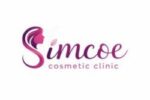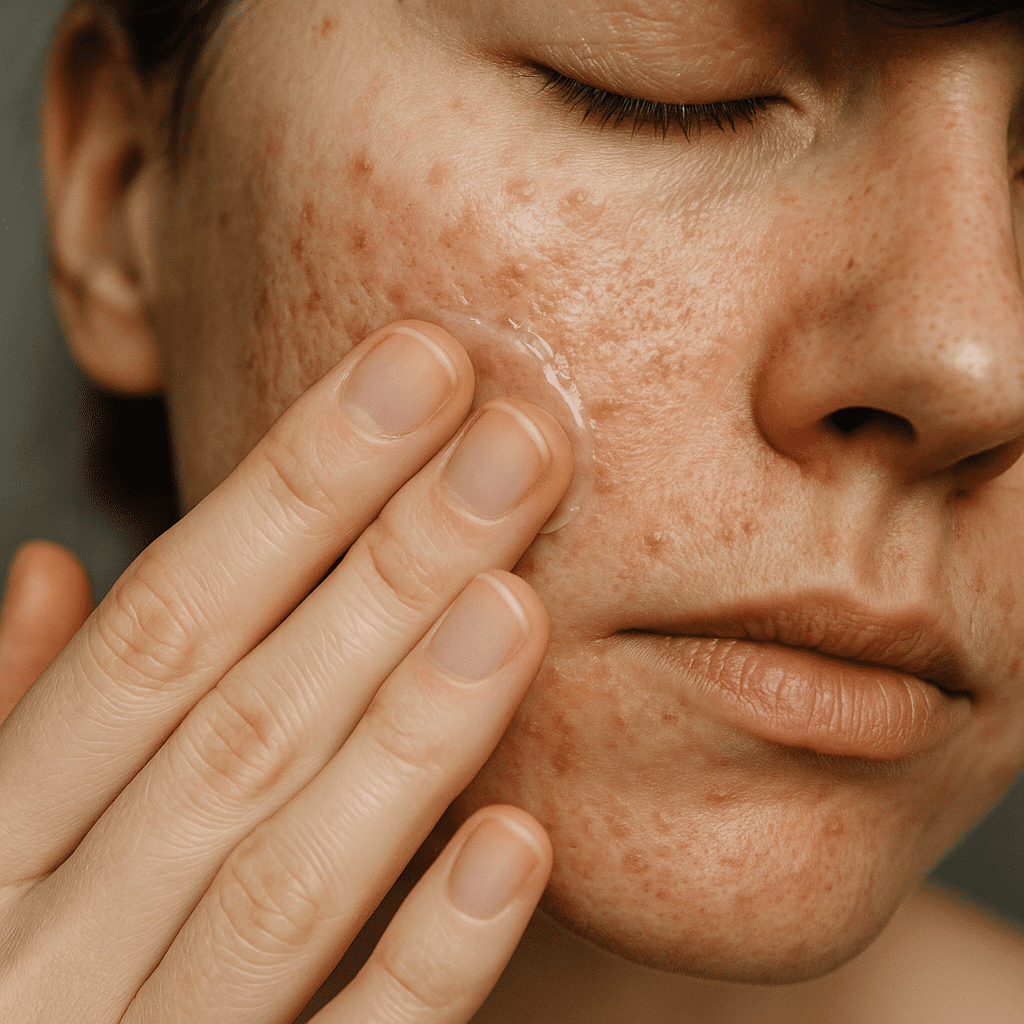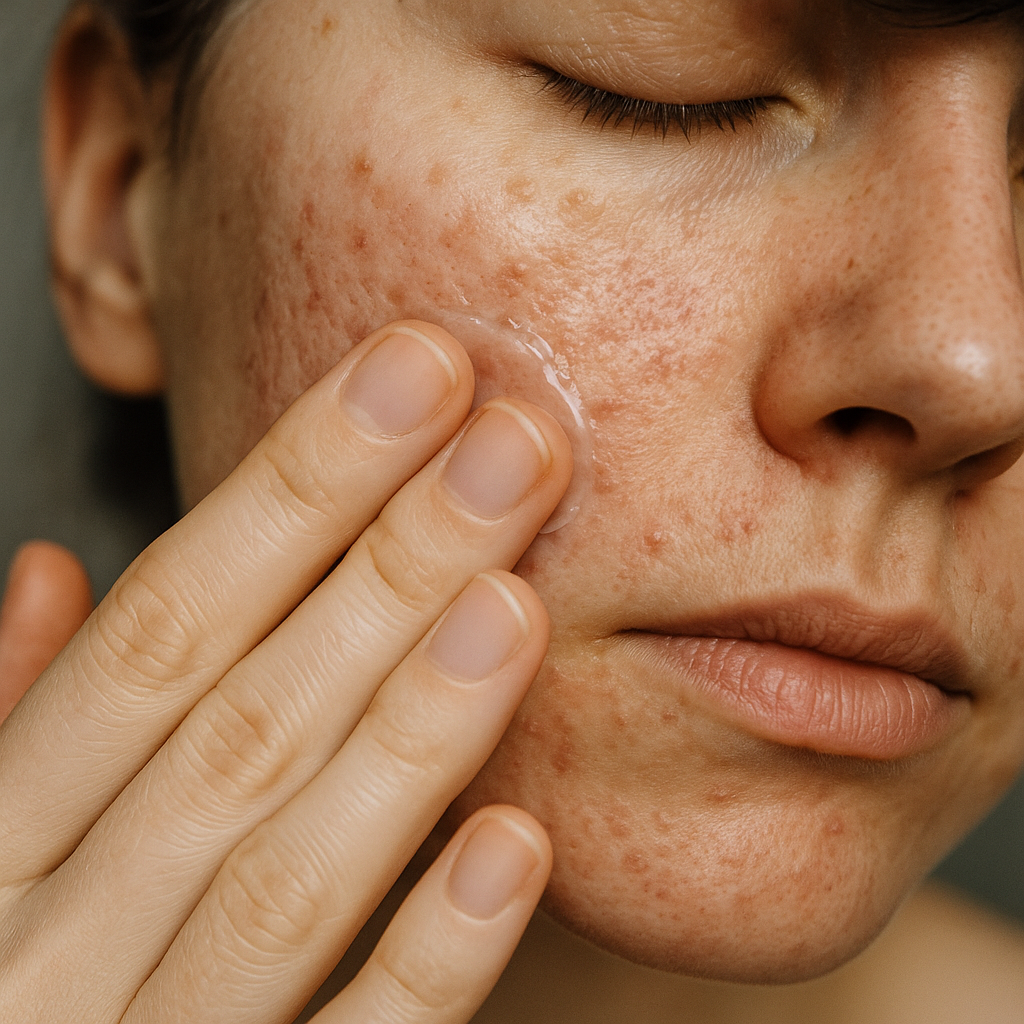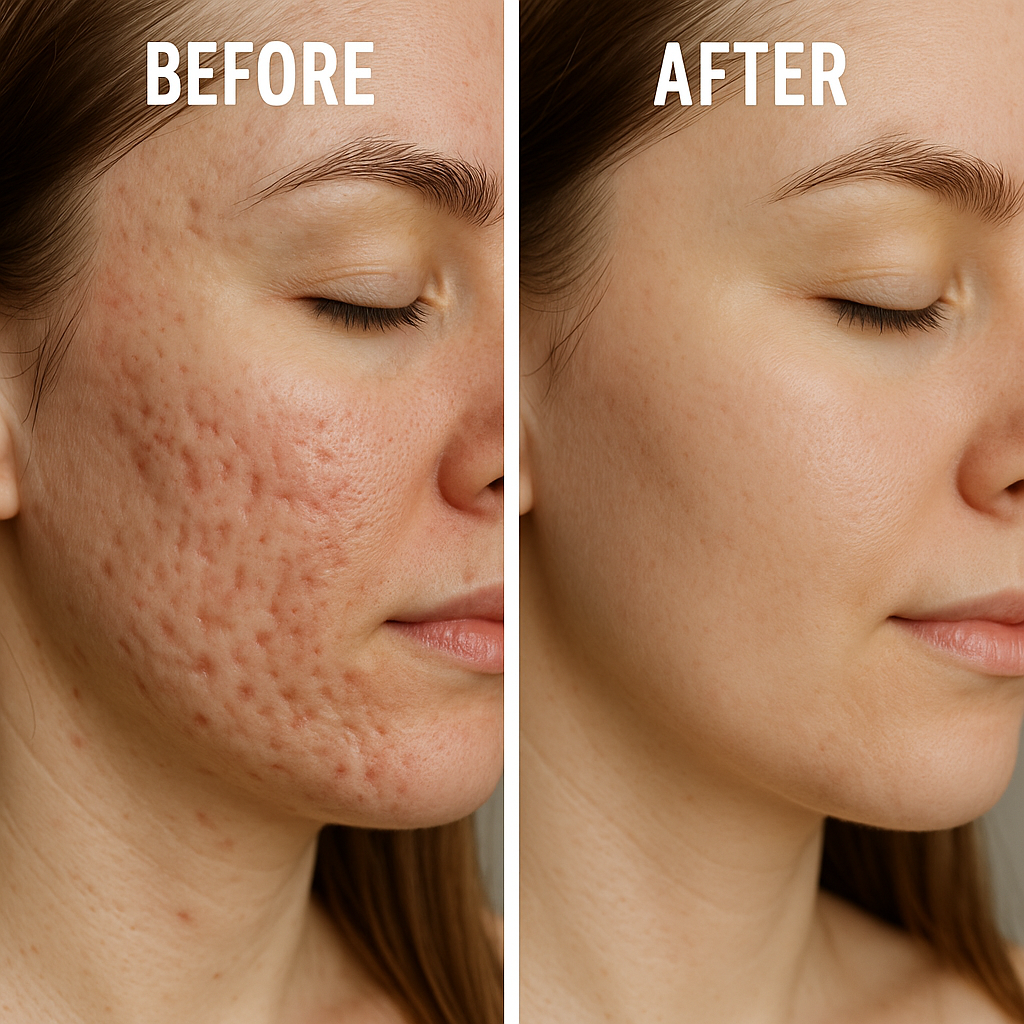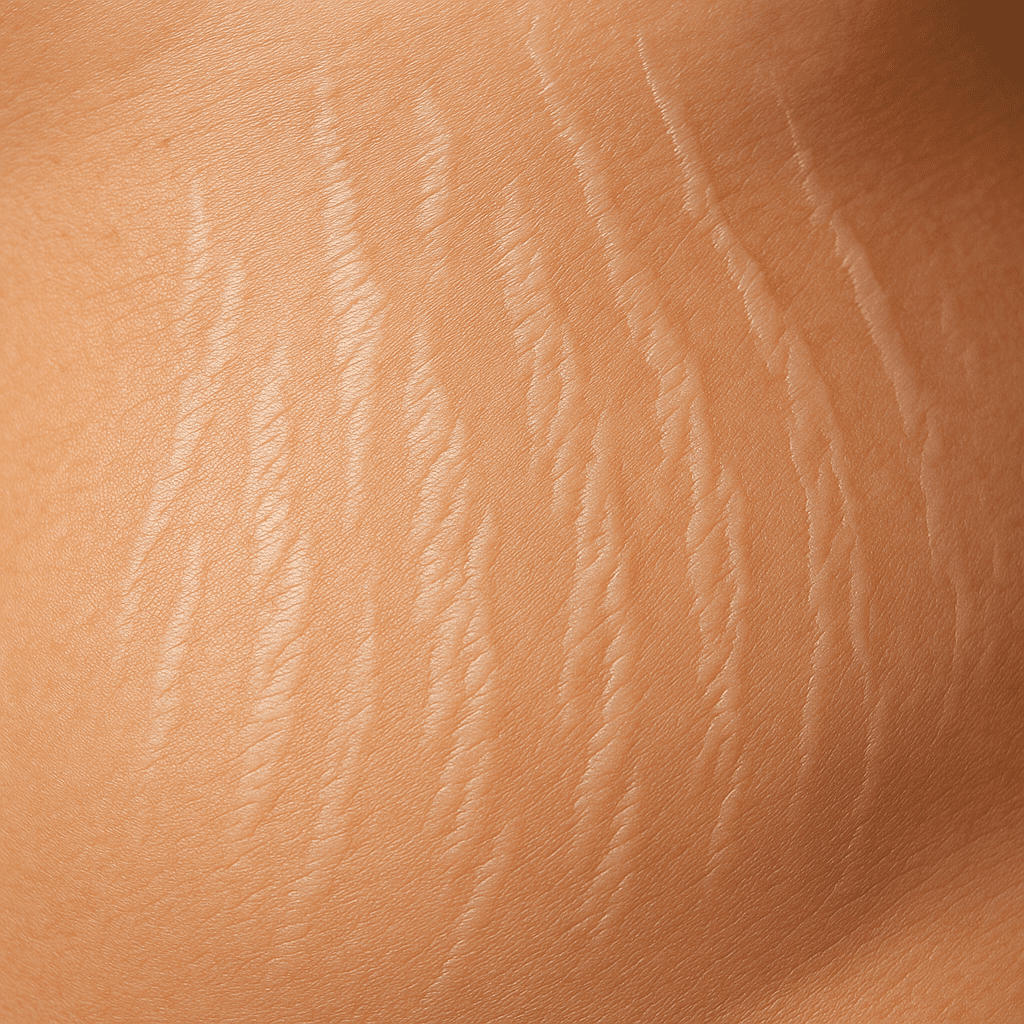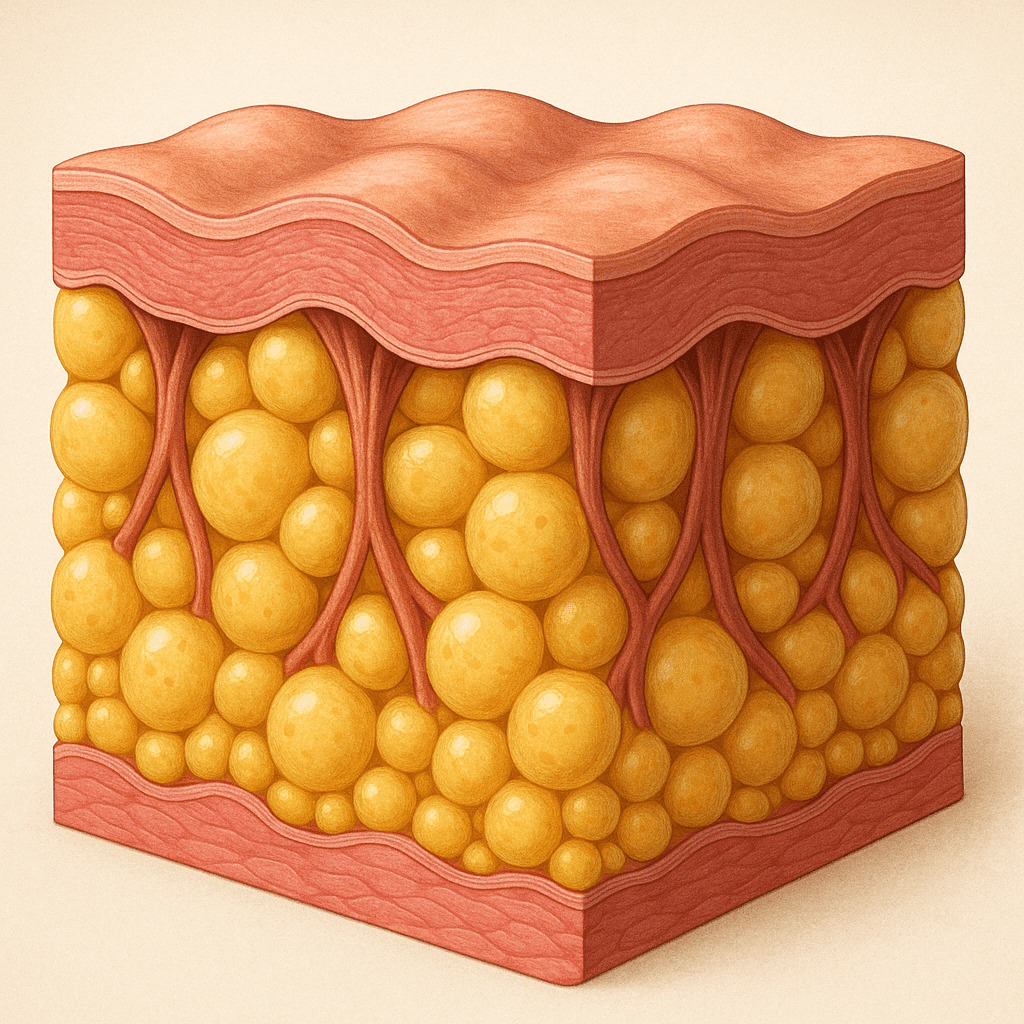Everyone knows that acne scars can be stubborn and frustrating to deal with.
But what are the best ways to treat acne scars at home?
Here’s a complete step-by-step guide that walks you through the most effective home treatments and expert tips.
Some treatments work by stimulating collagen production deep within the skin.
Some are gentle but powerful enough to brighten discoloration caused by scars.
Some approaches combine natural remedies with scientifically proven skincare ingredients.
Some require consistency and patience but reward you with gradual, lasting improvement.
Some treatments are safe for all skin tones and types.
Let’s dive right in.
How Do Acne Scars Form and Why Do They Persist?
Understanding how acne scars develop is key to knowing how to treat them at home effectively. When an acne lesion penetrates deeply into the skin, it damages the collagen structure beneath the surface. The body tries to heal this damage by producing new collagen, but sometimes the collagen production is either insufficient or excessive.
This leads to three main types of acne scars: atrophic (sunken scars like icepick, boxcar, or rolling scars), hypertrophic (raised scars), and keloid scars (thick, raised, and often pigmented).
Atrophic scars occur when the skin lacks enough fibroblasts—the cells responsible for collagen production during wound healing—resulting in indentations. Raised scars happen when there is excessive collagen build-up.
Because scars are essentially the skin’s way of repair, they do persist and sometimes become permanent without treatment.
Learning how to treat acne scars at home involves strategies to rebalance collagen, promote skin cell turnover, and improve skin texture and pigmentation.
Which Home Treatments Work Best for Acne Scars?
Not all acne scars are the same, and neither are treatment options. Here are the most effective home treatments supported by science for improving acne scars:
- Topical acids to boost skin renewal: Ingredients like salicylic acid, alpha hydroxy acids (AHAs such as glycolic acid or lactic acid), and retinoids can exfoliate dead skin cells, encourage cell turnover, and lighten hyperpigmentation.
- Microneedling (Dermarolling): A method that uses tiny needles to create controlled micro-injuries, triggering collagen production and skin regeneration.
- Natural remedies: Certain natural ingredients have anti-inflammatory and lightening properties, such as diluted apple cider vinegar (contains lactic acid), aloe vera, or honey.
- Sun protection: Critical in preventing scars from darkening further due to UV exposure.
- Consistent skincare routines: Gentle cleansing, moisturizing, and avoiding picking at scars are foundational.
Using these treatments correctly and consistently can significantly improve the appearance of acne scars over time. For example, salicylic acid not only exfoliates but also clears debris from pores and reduces inflammation, suitable even for darker skin tones without large risks of hyperpigmentation [source].
Did you know? Microneedling at home is possible but must be done very carefully to avoid infections or injury. Professional treatments deliver better outcomes and safety, but a home dermaroller with proper sanitization can provide gradual improvement [source].
Step-by-Step Guide to Treating Acne Scars at Home
This stepwise plan provides a comprehensive and safe way to tackle acne scars yourself.
1. Start With Skin Evaluation and Safety
Before applying any treatments, check your skin type, acne scar types, and any active acne or wounds. Avoid any invasive procedures on broken or inflamed skin, as this risks infections.
Perform a patch test when trying new topical acids or natural remedies to prevent irritation.
2. Cleanse Gently but Thoroughly
Use a pH-balanced gentle cleanser suited to your skin to remove dirt, oil, and bacteria. This preps the skin, allowing treatments to penetrate better without causing dryness or irritation.
3. Apply Chemical Exfoliants Thoughtfully
Introduce topical acids such as 2-10% salicylic acid or AHAs gradually, starting once or twice a week, then increasing as tolerated. These raise skin turnover, smooth texture, and can lighten dark spots.
Retinoids (like adapalene or tretinoin) are powerful agents promoting cellular renewal and fighting inflammation. Use at night and wear sunscreen during the day, as retinoids increase sun sensitivity.
4. Incorporate Microneedling Carefully
If you opt for dermarolling, use a device with appropriate needle length (0.25mm to 0.5mm for home use). Disinfect the roller in 70% isopropyl alcohol before and after each use.
Roll evenly over the scarred areas, avoid active acne spots, and follow with calming moisturizers. Limit sessions to once every 1-2 weeks allowing skin time to recover.
5. Use Targeted Natural Remedies
Natural ingredients like diluted apple cider vinegar (contains lactic acid), aloe vera gel, or vitamin E oil can soothe skin and lighten scars. Always dilute potent natural acids and test carefully.
6. Moisturize and Protect Your Skin
Hydration is vital to support skin healing. Use non-comedogenic moisturizers that suit your skin type.
Daily broad-spectrum sunscreen with at least SPF 30 protects scar tissue from darkening and prevents further damage.
7. Maintain Consistency and Patience
Acne scar treatment is a marathon, not a sprint. Visible results often take several weeks to months. Persistence combined with the right regimen brings the best outcomes.
Can I Treat All Types of Acne Scars at Home?
While home treatments favorably impact many scar types, the effectiveness depends on the scar’s nature.
- Atrophic scars: Respond well to microneedling, chemical exfoliants, and fillers. Home microneedling and topical acids can improve depth and texture over time.
- Hypertrophic and keloid scars: These raised scars often require professional interventions such as corticosteroid injections, laser therapy, or silicone sheets. At-home creams with silicone or onion extract may help but rarely remove scars fully.
- Hyperpigmented scars: Brightening acids like AHAs, retinoids, and sun protection are essential to lighten dark marks.
If you notice persistent, raised scars or scars that cause itching or pain, consult a dermatologist to avoid worsening and explore advanced options safely.
Tips to Avoid Acne Scarring in the First Place
Prevention is better than cure. You can minimize scarring by following these expert tips:
- Start effective acne treatments early to reduce severity and inflammation.
- Avoid picking, squeezing, or popping acne lesions.
- Keep your skin clean but avoid over-exfoliation or harsh scrubbing that can worsen scars.
- Use sunscreen daily to prevent scars from darkening.
- Maintain a healthy diet rich in anti-inflammatory foods that support skin healing.
- Stay hydrated for optimal skin repair and elasticity.
Wondering how long it takes for acne scars to fade at home?
Patience is key—depending on scar type, texture, and treatment, improvements may be noticeable in 6-12 weeks and continue beyond. Some scars need professional treatment for dramatic results.
When Should You Consult a Professional for Acne Scar Treatment?
If home treatments are not helping after several months, or you have deep, large, or raised scars, consider professional options. Dermatologists offer:
- Chemical peels with stronger acids tailored to your skin type [source]
- Microneedling combined with platelet-rich plasma (PRP) therapy for enhanced collagen stimulation
- Laser resurfacing to reduce scar depth and pigmentation
- Corticosteroid injections for keloid and hypertrophic scars
- Scar revision surgeries for certain severe cases
Choosing a qualified professional ensures treatments suit your skin and minimize risks.
Common Mistakes to Avoid When Treating Acne Scars at Home
- Over-exfoliating: Using too many acids or scrubs can damage your skin barrier and worsen scars.
- Skipping sunscreen: UV exposure darkens scars and slows healing.
- Using harsh or untested natural remedies: Some home remedies may cause irritation or pigment changes if not used wisely.
- Ignoring skin reactions: Stop treatments if you experience excessive redness, burning, or pain and seek advice.
- Expecting instant results: Scar improvement takes time and consistent care.
What’s the single best habit to protect your skin and reduce scars? Wearing a broad-spectrum sunscreen daily—no exceptions.
Frequently Asked Questions About At-Home Acne Scar Treatment
Can acne scars go away on their own?
Many scars fade with time, especially red or pigmented marks, but indented or raised scars often remain without active treatment.
Is microneedling safe to do at home?
Yes, with proper sanitization and needle length up to 0.5mm, but risks of infection and injury exist. Professional treatments provide superior and safer results.
Which over-the-counter product is best for acne scars?
Products with salicylic acid, AHAs, or retinoids are highly effective. Use as directed and protect skin from sun damage.
Can natural remedies replace chemical treatments?
Natural remedies can complement but rarely replace proven chemical exfoliants and professional treatments for visible improvement.
How long until I see results from home treatments?
Expect to see subtle improvements within 6-12 weeks with consistent use; deeper scars may take longer or need professional care.
What’s Your Next Step?
Tell us in the comments: How will you apply this to your skincare routine? For personalized advice, explore our detailed Effective Acne Treatment in Barrie guide to complement your home care journey!
Remember, consistent, informed care combined with patience leads to smoother, younger-looking skin. Start your acne scar improvement journey today—your future self will thank you.
Check out expert hydration tips to support your skin health from the inside out. Skin restoration starts with whole-body wellness.
